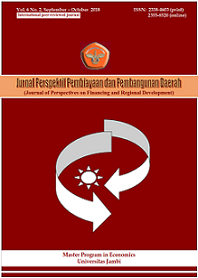Fiscal Policy and Economic Stability: A Case of Pakistan
DOI:
https://doi.org/10.22437/ppd.v6i2.5352Abstract
This paper aims to assess the impact of fiscal policy on the economic stability within Pakistan. The findings indicate that the fiscal policy process constitutes the subsequent impact on the GDP, FDI, discount rate and CPI. That is to say, the corresponding expansionary and contractionary fiscal process has a direct and significant impact on the overall productivity, the foreign investment, the interest rates and the inflation process of the state. However, in comparison to these three variables, the exchange rate has an indirect impact and is lesser significant as compared to the other variables. The findings help stakeholders to understand how the overall fiscal policy affects the economic and business cycle of the country and how each individual is affected by the decisions made by the government executives in constituting the fiscal policy.
Downloads
References
Afonso, António & Claeys, Peter (2007). "The dynamic behavior of budget components and output," Working Paper Series 0775, European Central Bank.
Agha, A. I., & Khan, M. S. (2006). An empirical analysis of fiscal imbalances and inflation in Pakistan. SBP Research Bulletin, 2(2), 343-362.
Alesina, A & R Perotti (1995). "Fiscal Expansions and Fiscal Adjustments in OECD Countries," NBER Working Papers 5214, August, National Bureau of Economic Research
Carlos Marinheiro (1998),†The Stability Pact and the Portuguese Fiscal Policy: the application of a VAR Modelâ€, Faculty of Economics, University of Coimbra
Catao, L. and E.M. Terrones (2003). Fiscal Deficits and Inflation. IMF Working Paper WP/03/65.washington, D.C.
Dario Caldara, Christophe Kamps (2008), “What are the effects of Fiscal Policy Shocks? A VAR Based Comparative Analysisâ€, European Central Bank, Working Paper Series
Devarajan, S., Swaroop, V., & Zou, H.-f. (1996), "The Composition of Public Expenditure and Economic Growth", Journal of Monetary Economics, Vol. 37, pp. 313-344.
Easterly, W., & Rebelo, S. (1993), "Fiscal policy and economic growth: An empirical investigation", Journal of Monetary Economics, Vol. 32, pp. 417-458. http://www.nber.org/papers/w4499
Favero, C and F Giavazzi (2007), “Debt and the effects of fiscal policyâ€, NBER Working Paper 12822, January, pp 26.
Florian Hoppner (2001), “A VAR Analysis on the Effects of Fiscal Policy in Germanyâ€, Institute for International Economics, University of Bonn,
Fowlie, K (1999), “Automatic fiscal stabilizersâ€, Treasury Working Paper 99/7, 15.
Giavazzi, Francesco & Pagano, Marco (1990). "Can Severe Fiscal Contractions Be Expansionary? Tales of Two Small European Countries," CEPR Discussion Papers 417, C.E.P.R. Discussion Papers.
Kneebone, R. D., & McKenzie, K. J. (1999), "The Characteristics of Fiscal Policy in Canada", Canadian Public Policy, Vol. 25 No. 4, pp. 483-501.
Kneller, R., Bleaney, M. F., & Gemmell, N. (1999), "Fiscal policy and growth: evidence from OECD countries", Journal of Public Economics, Vol. 74, pp. 171–190.
Li, Q., & Resnick, A. (2003). Reversal of fortunes: Democratic institutions and foreign direct investment inflows to developing countries. International organization, 57(1), 175-211.
Makki, S. S., & Somwaru, A. (2004). Impact of foreign direct investment and trade on economic growth: Evidence from developing countries. American Journal of Agricultural Economics, 86(3), 795-801.
Mountford, A.; Uhlig, H. (2005), "What are the effects of fiscal policy shocks?†Humboldt-Universität zu Berlin Working Paper SFB Nº. 649.
Perotti, R. (1999), “Fiscal policy in good times and badâ€, Quarterly Journal of Economics, 114, 1399-1436.
Roberto Perotti (2004). "Estimating the effects of fiscal policy in OECD countries," Working Papers 276, IGIER (Innocenzo Gasparini Institute for Economic Research), Bocconi University.
Sandro, Raffaela, Stefano and Roberto (2008), “The Effects of Fiscal Policy in Italy: Evidence from a VAR Modelâ€, Social Science Research Network Papers,
Sarfraz, A., & Anwar, M. (2009). Fiscal Imbalances and Inflation: A Case Study of Pakistan. Pakistan journal of social sciences (PJSS), 29(1).
Shahid Ali and Naved Ahmad (2010), “The Effects of Fiscal Policy on Economic Growth: Empirical Evidences Based on Time Series Data from Pakistanâ€, the Pakistan Development Review Paper 49:4 Part 2, pp 497-512.
Downloads
Published
How to Cite
Issue
Section
License
Copyright (c) 2018 Farhan Ahmed, Suman Talreja, Yasir Aman, Govinda Lohana

This work is licensed under a Creative Commons Attribution 4.0 International License.

















